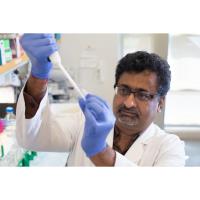USA researcher awarded $1.39 million grant to study prostate cancer disparities
MOBILE, Ala. – With a grant from the U.S. Department of Defense, investigators at the University of South Alabama and USA Health will examine the molecular causes and mechanistic underpinnings of racial disparities in prostate cancer. The grant totals $1.39 million, which will be awarded over a three-year period.
Prostate cancer disproportionately affects Black men, who are two-thirds more likely to get the disease and twice as likely to die from it than white men. “To address race-associated prostate cancer disparities, it is important first to understand how tumors from different races differ in their biology and molecular landscape,” said Ajay Singh, Ph.D., professor of pathology at the Frederick P. Whiddon College of Medicine at USA and principal investigator of the project.
While much emphasis has been placed on socioeconomic aspects and access to quality healthcare, a biological basis of health disparities has remained poorly understood. “Through collaborative research, we are trying to understand the impact of socioeconomic factors on our biology that adversely affect health outcomes and enhance the risk of getting certain diseases, including cancer,” said Singh, who also leads the cancer biology and cancer health disparities programs at the USA Health Mitchell Cancer Institute.
Socioeconomic and psychosocial stressors, such as racial discrimination, poverty and work-related sleep disruptions, have serious consequences on health. These factors have been associated with increased levels of the stress hormone and inflammatory cytokines in the blood of Black individuals. “However, the significance of such observations in enhancing the risk of cancer diagnosis, aggressive disease progression, and clinical outcomes, is not clear,” Singh said.
Researchers have made several preliminary observations that provide clues for a molecular and mechanistic basis of disparate prostate tumor biology between Black and white patients. “Our proposed research will generate data to add the missing pieces in the puzzle and provide a clearer picture,” Singh said. “These newer insights will guide the development of more effective and tailored strategies for prostate cancer management, thus narrow the health disparity gaps, and improve the life expectancy of all patients.”
Singh added, “Cancer is a complex disease, and it takes a village to address complex problems.”
The team includes Mohammad Aslam Khan, Ph.D., a senior research associate, and Shashi Anand, Ph.D., a postdoctoral fellow, who played significant roles in developing preliminary supporting data. Other team members include Seema Singh, Ph.D., professor of pathology and an expert in inflammation and stress signaling; Santanu Dasgupta, Ph.D., assistant professor of pathology and an expert in tumor biomarkers; Elliot Carter, M.D., professor of pathology and a board-certified diagnostic pathologist; and Christopher Keel, D.O., associate professor and interim chair of the department of urology.



